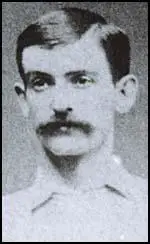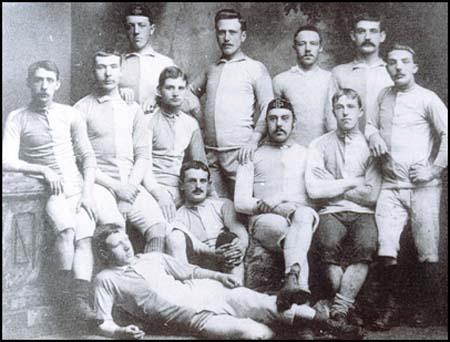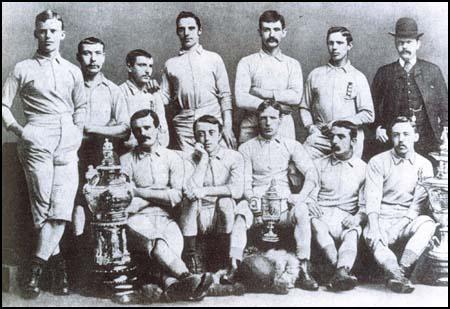Fergie Suter

Fergie Suter was born in Blyswood, Scotland on 21st November, 1857. Suter was a stonemason but he also played football for Partick Thistle and Glasgow Rangers in the Scottish League. This talented full-back eventually moved south and began playing for Darwen.
In 1880 Suter joined Blackburn Rovers. Two other Scottish players, Jimmy Douglas and Hugh McIntyre, also joined at this time. However, the team also included some of the men who originally formed the team in 1875 such as Fred Hargreaves, John Hargreaves and Doctor Greenwood.
Darwen was very upset when Suter signed for Blackburn Rovers and accused the club of paying for his services. At this time football professionalism was illegal. However, Darwen did not make an official complaint as it was well known that Suter had given up his career as a stonemason as soon as he arrived in Lancashire.
Blackburn Rovers played Darwen in a friendly on 27th November 1880. In an attempt to embarrass Blackburn Rovers for recruiting Scottish players, Darwen officials announced that their team would only include men who had been "Darwen born and bred". The score was 1-1 when in the second-half the players began fighting after an incident involving Fergie Suter. The crowd joined in and the referee was forced to abandon the game.
In 1882, Blackburn became the first provincial team to reach the final of the FA Cup. Their opponents was Old Etonians who had reached the final on five previous occasions. However, Blackburn had gone through the season unbeaten and was expected to become the first northern team to win win the game. Doctor Greenwood was injured the team included four players who had won international caps, Fred Hargreaves, John Hargreaves, Hugh McIntyre and Jimmy Brown.
The Old Etonians scored after eight minutes and despite creating a great number of chances, Blackburn was unable to obtain an equalizer in the first-half. Early in the second-half George Avery was seriously injured and Blackburn Rovers was reduced to ten men. Despite good efforts by Jimmy Brown, Jack Hargreaves and John Duckworth, Rovers were unable to score.
Blackburn Rovers did even better in that year's Lancashire Cup. After victories against Accrington Wanderers (7-0), Church (6-0) they beat Blackburn Olympic 6-1 in the semi-final. Blackburn won the cup by beating Accrington 3-1 in the final.

back row: Doctor Greenwood, R. Howorth, John Hargreaves, Fergie Suter,
Middle row: John Duckworth, Hugh McIntyre, H. Sharples, Fred Hargreaves, Tot
Strachan, George Avery. Sitting on the floor: Jimmy Brown and Jimmy Douglas.
The following year Blackburn Rovers were in favourites to win the FA Cup. However, an injury hit Rovers were beaten 1-0 in the second round by local rivals Darwen. The Blackburn Times reported that this was a major surprise as the "play was so much in the Rovers' favour that Howorth (the goalkeeper) never handled the ball throughout the match." The defeat was made worse when the town's other main football club, Blackburn Olympic, became the first northern team to win the cup by beating Old Etonians in the final.
In the 1883-84 season Blackburn Rovers added another outsider into the team. John Inglis, a Scottish international, had recently been playing for Glasgow Rangers. The Blackburn Times reported: "There is one point about Blackburn Rovers that does not give entire satisfaction and this is the introduction of Inglis of the Glasgow Rangers. It is "hard lines" on Sowerbutts or whoever else is supplanted, that after the faithful services of the past he should be pushed out in this manner, and besides that there is a class of people in the town who would rather lose the Cup on their merits than win it with the aid of a specially introduced stranger." In fact, Joe Sowerbutts, a local lad, had emerged as one of the stars of the team, and retained his place alongside Inglis.
After Blackburn Rovers beat Notts County in the semi-final of the FA Cup, the club made an official complaint to the Football Association that John Inglis was a professional player. The FA carried out an investigation into the case discovered that Inglis was working as a mechanic in Glasgow and was not earning a living playing football for Blackburn Rovers. Inglis played in the final against Queens Park. The Scottish club scored the first goal but Blackburn Rovers won the game with goals from Blackburn lads, James Forrest and Joe Sowerbutts.

Cup that they won in 1883-84 season. Back row, left to right: Joseph Lofthouse,
Hugh McIntyre, Joe Beverley, Herbie Arthur, Fergie Suter, James Forrest,
Richard Birtwistle, Front row: Jimmy Douglas, Joe Sowerbutts, Jimmy Brown,
George Avery and John Hargreaves.
In January, 1884, Preston North End played the London side, Upton Park, in the FA Cup. After the game Upton Park complained to the Football Association that Preston was a professional, rather than an amateur team. Major William Sudell, the secretary/manager of Preston North End, admitted that his players were being paid but argued that this was common practice and did not breach regulations. However, the Football Association disagreed and expelled them from the competition.
Blackburn Rovers, who denied they were paying their players, beat Old Carthusians 5-0 in the semi-final of the FA Cup. Once again they had to play Queens Park in the final. Blackburn Rovers was now a team full of internationals. This included Hugh McIntyre, James Forrest, Herbie Arthur, Joseph Lofthouse, Jimmy Brown and Jimmy Douglas. A crowd in excess of 12,000 arrived at the Oval to see the what most people believed were the best two clubs in England and Scotland. With goals from Brown and Forrest, Blackburn Rovers won 2-0.
At the end of the 1883-84 season Preston North End joined forces with other clubs who were paying their players, such as Aston Villa and Sunderland. In October, 1884, these clubs threatened to form a break-away British Football Association. The Football Association responded by establishing a sub-committee, which included William Sudell, to look into this issue. On 20th July, 1885, the FA announced that it was "in the interests of Association Football, to legalise the employment of professional football players, but only under certain restrictions". Clubs were allowed to pay players provided that they had either been born or had lived for two years within a six-mile radius of the ground.
Blackburn Rovers immediately registered as a professional club. Their accounts show that they spent a total of £615 on the payment of wages during the 1885-86 season. Despite the fact that clubs could now openly pay their players, Blackburn Rovers continued to dominate English football. They reached the 1885 FA Cup Final by beating Darwen Old Wanders (6-1), Staveley (7-1), Brentwood (3-1) and Swifts (2-1) Seven of the Blackburn Rovers team were appearing in their third successive final, whereas Hugh McIntyre, Fergie Suter, Jimmy Brown and Jimmy Douglas were playing in their fourth final in five season. The game against West Bromwich Albion at the Oval ended in a 0-0 draw.
The replay took place at the Racecourse Ground, Derby. A goal by Joe Sowerbutts gave Blackburn Rovers an early lead. In the second-half James Brown collected the ball in his own area, took the ball past several WBA players, ran the length of the field and scored one of the best goals scored in a FA Cup final. Blackburn Rovers now joined the Wanderers in achieving three successive cup final victories.
The decision by the Football Association to allow clubs to pay their players increased their out-goings. It was therefore necessary to arrange more matches that could be played in front of large crowds. In March, 1888, William McGregor, a director of Aston Villa, circulated a letter suggesting that "ten or twelve of the most prominent clubs in England combine to arrange home and away fixtures each season." The following month the Football League was formed. It consisted of six clubs from Lancashire (Blackburn Rovers, Preston North End, Accrington, Burnley and Everton) and six from the Midlands (Aston Villa, Derby County, Notts County, Stoke, West Bromwich Albion and Wolverhampton Wanderers). The main reason Sunderland was excluded was because the other clubs in the league objected to the costs of travelling to the North-East.
The first season of the Football League began in September, 1888. Preston North End won the first championship that year without losing a single match and acquired the name the "Invincibles". Blackburn Rovers, who had lost most of their best players to retirement, finished in 4th place, 14 points behind Preston. Fergie Suter only played in one game that season and left the club in 1889.
Primary Sources
(1) Archie Hunter, Triumphs of the Football Field (1890)
I've got to tell you of a very important player now, Fergus Suter, "Fergie" as we call him, came to England in the same year as myself; and we two led the Scotch Exodus, as it has been called. Fergie was a Glasgow man and he commenced his football career by playing the Rugby game when he was very young. When he went over to the Association side he started as a forward, but ever since I have known him he has played "back" and a grand "back" he is. He belonged to the Partick Club and then became a member of the Glasgow Rangers; and in 1878 he went to Darwen and practically taught that club the game. He travelled to London to fight for the Association Cup, but after three attempts his team was beaten.
He was best known, however, as one of the strongest supports of the Blackburn Rovers and he played a very fine game. I met him many times and always found him honest and good-hearted on the field. He won a large number of gold and silver medals and it is said that he played for Lancashire against every English county. He took part in all the ties in which the Rovers were engaged, and helped his club to defeat Queen's Park and West Bromwich Albion and win the cup.
Then there is Ross, an Edinburgh man, called "the little demon," on account of his quick, smart play. He was a grand shot at goal and is still playing for Preston North End. He played for a time, however, with the Everton, but the Preston Club was his first love. His brother - familiarly known as Nick Ross... was practically the man who brought Preston North End into notoriety. He was a full back and played splendidly.
